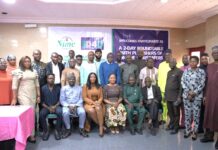FG’s 2-Week Ultimatum On SIM-NIN Integration As Far From The Reality
TECH DIGEST – The move by the Federal Government to block all Subscriber Identification Modules (SIMs) without National Identification Number (NIN) is quite ambitious and will definitely a step in the right direction towards tackling issues around insecurity in the country.
But, we want to quickly say that the two weeks ultimatum appears to be an unrealistic venture that will leave millions of Nigerians in limbo.
The ultimatum which was officially issued on Tuesday following the meeting amongst the Ministry of Communications and Digital Economy, Nigeria Communications Commission (NCC), and other industry stakeholders means that Telcos like MTN, Glo, 9mobile, and Airtel will have to disconnect over 150 million lines that are yet to be synchronized with valid National Identification Number from 31st December 2020.
The idea was conceived at the beginning of the year when the Minister of Communications and Digital Economy, Dr. Isa Ali Ibrahim Pantami wanted all Nigerians to immediately secure Digital Identification from the National Identity Management Commission and submit it to the Network Operators.
Nigerians understand that the entire goal of was to improve digital security by consolidating the achievement of the SIM Card registration exercise of September 2019 and embark on another audit of the Subscriber Registration Database again. However, the question remains how realistic this venture would become.
The motive for this sudden inspiration for all telecoms subscribers to provide their NIN is suspicious and speaks volumes. How do you issue marching orders after a ‘stakeholders meeting’ on Telcos to update records in two weeks for over 150m active subscribers gained in over two decades?
Available data from the NCC indicate that there are 216 million lines connected, only 149 million are active. GSM operators run 147 million lines, 1.2 million are CDMA-controlled, and fixed wired/wireless operators have 176,579 lines.
At the moment, only 42 million out of 200 million Nigerians have already obtained the National Identification Number (NIN), according to figures obtained from the National Identity Management Commission (NIMC).
This means from now till the end of the year, these people are expected to update their valid National Identification Number (NIN) with their respective mobile operators. While the remaining over 150 million people are to queue at various National Identity Management Commission (NIMC) centers to get their National Identity Number.
NIMC is the agency saddled with the responsibility, to deliver on the national project of issuing National Identification Numbers to Nigeria. Sadly, the performance in terms of delivering on the project is nothing but abysmal failure.
The agency has been able to capture the database of only 42 million people from 2007 to date. Although, its operations have been bedevilled by lack of registration centers, transparency, lack of accountability in disbursing the funds, shortage of staff, technological inadequacies, to mention but a few.
Read Also:
However, about ten months ago, the World Bank approved a whopping $430m for Nigeria of which NIMC was supposed to receive certain percentage to pursue NIN registration for 150 million Nigerians ‘in a couple of years. So, how far with the fund?
With all the aforementioned issues, if it took NIMC 13 years to get 42 million people registered, then, how possible is it going to be for over 150 million people to do the same thing within two weeks?
In 2019, the Ministry of Education wanted to make the possession of the National Identity Number (NIN) one of the conditions for registering for the Unified Tertiary Matriculation Examination (UTME) for admission into the university and other tertiary institutions.
This directive failed woefully due to the ugly experiences encountered by students at the various NIMC registration centers across the country. Many of the prospective students had to queue under the scorching sun just to obtain their National Identity Number.
The situation had prompted the lawmakers at the House of Representatives to instruct the Joint Admissions and Matriculation Board (JAMB) to suspend its new policy requiring the NIN for UTME candidates.
Based on recommendations from security agencies in the country, the Ministry of Communication believes that SIM cards are usually involved in most of the crimes committed in the country and the NCC regulator should notify all Telecom operators that after September 25th any SIM that is involved in crime should be traceable to a particular individual.
“From investigations, 99 percent of crimes committed in Nigeria, are connected to SIM cards. The government cannot think of any economic benefits, without first taking into account the primary constitutional responsibility of the executive, which is to protect lives and properties,” Pantami said on September 18, 2019, in a statement
We urge the Ministry of Communication and Digital Economy and the telecom industry regulators to reconsider the unrealistic timeline just like the lawmakers at the House of Representatives on Wednesday suggested.
We believe the timeline should span between 2 to 3 years to enable Nigerians to do the right thing.
The biggest problem lies with NIMC; the funds allocated to the assignment should be properly channeled to upgrade the infrastructure needed to get the job done. Again, NIMC should strategically collaborate with other agencies or institutions such as the Nigeria Computer Society to decentralize the entire registration process.
On mitigating the issues of insecurity, the Federal Government must start looking seriously into reducing the rate of unemployment and lack of education in the country. Many young Nigerians have resorted to all manner of crimes due to unemployment. Also ensuring that many young people are productively engaged and educated will play a huge role in reducing the crime rate.
Further, this is the wrong timing for millions of Nigerians to start queuing at NIMC centers to get their National Identity Number due to the spike in the cases of COVID-19. According to the Nigeria Centre for Disease Control (NCDC) as of 15th of December 2020, 758 new confirmed cases and 3 deaths were recorded in Nigeria. To date, 74,132 cases have been confirmed, 66,494 cases have been discharged and 1,200 deaths have been recorded in 36 states and the Federal Capital Territory.



















